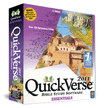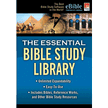 photo © 2005 Borja Fernandez | more info (via: Wylio)In part 1 of this series I mentioned the first Bible software I ever saw in operation. It was on about a dozen diskettes like the one you see pictured at right; a 5¼" square sleeve with a flimsy disc inside which was capable of holding 720kb of information (for comparison, most of the MP3 songs on my hard drive right now are ten times that size). A search of the Bible text, which was spread across many disks, involved starting the query, listening to the diskette drive thrash around for a while, then when the computer prompted you, taking out one diskette and inserting the next one... for every one of the diskettes. At the time, personal computer hard drives were a bit of a novelty. The software was a bit of a novelty at the time, too; I could look up the words in Strong's Concordance faster than I could look them up using the software. But it was a start!
photo © 2005 Borja Fernandez | more info (via: Wylio)In part 1 of this series I mentioned the first Bible software I ever saw in operation. It was on about a dozen diskettes like the one you see pictured at right; a 5¼" square sleeve with a flimsy disc inside which was capable of holding 720kb of information (for comparison, most of the MP3 songs on my hard drive right now are ten times that size). A search of the Bible text, which was spread across many disks, involved starting the query, listening to the diskette drive thrash around for a while, then when the computer prompted you, taking out one diskette and inserting the next one... for every one of the diskettes. At the time, personal computer hard drives were a bit of a novelty. The software was a bit of a novelty at the time, too; I could look up the words in Strong's Concordance faster than I could look them up using the software. But it was a start!Fast forward a couple of years. I was at some event, a Christian rock concert or something, and I picked up a demo disk of some software called "Gospel Godspeed." The disk had, I believe, just the four Gospels and not the whole Bible on it, but it was on a single floppy, and the search was lightning fast. The materials that came with the software indicated that the reason for the speed of the search and for the amount of data that would fit on the single floppy was a proprietary compression/indexing method that had been created by the developer. I thought it was incredible! I never ran across the full version, but to my surprise, it appears to still be available. Who would've thought that a piece of Bible software could last 20+ years? If you're under the age of about twenty, click the "Screens of GodSpeed in use and animated demo" link on that page and get a taste of what MS-DOS applications looked like, back before you were born!
The first serious piece of Bible software I ever owned was called QuickVerse. It arrived on the newer 3½" diskettes (a WHOLE BUNCH of them!), and you could buy multiple translations to add in. By this time hard drives were commonplace, which meant that not only could you have the whole Bible available at once, but you could have multiple translations open at once. One of my favorite things to do with QuickVerse was to divide the screen into four quadrants and open a different translation in each one, and link the four parts of the screen so that when you went to another verse or passage in one window, the other windows would change accordingly. Instant parallel Bible!
This may sound commonplace today, but when I first bought QuickVerse, it was an MS-DOS application, and this seemed positively amazing. You could also unlink the quadrants and display different passages, or open a notes screen in one and take notes, including links to other verses. (I spent some time trying to create a notes file which linked parallel passages from different parts of the Bible; I completed the links between identical events in the Gospels, and did some work in the Old Testament, but I never really completed it. The project died a premature death when the disk file got corrupted somehow, but I learned a lot doing it!)
QuickVerse was good software. I used it for a long time, and even purchased the NIV translation and several other add-ons (I honestly don't remember how many translations were available or how many I had, but I do remember there were several to choose from.) I spent many hours looking up Strong's definitions, doing word studies, and generally having a great time with QuickVerse. Later on a book format called STEP was developed, and Bible-related books in STEP format are still there to be found out on the Internet. I stuck with QuickVerse into the era of CD-ROMs; I still have my CDs of an old version. QuickVerse is still going strong today, with multiple editions available. I haven't used the latest incarnations, but it served me well for many years.
The next Bible software that I came across was much cheaper than QuickVerse. It was free! e-Sword is world-class Bible software at below-the-bargain-basement pricing. Rick Meyers, the software's author (and, incidentally, father of Christian Rock artist Krystal Meyers), gives it away for free for no other reason than that he wants to share the Word with others. e-Sword is amazing software; I've recommended it to many people. There are 20+ translations available for free, and 15+ more available for purchase at a nominal fee; you can view and search Hebrew and Greek definitions, Bible (and otherwise) dictionaries, commentaries, and your own user-generated notes. There are even devotionals and maps to download! The software is easy to use, and if you don't have Bible software and aren't ready to invest in a retail package, give e-Sword a download. It might be everything you need and more that you ever dreamed of, or it might even whet your appetite for something more! e-Sword provides the basics of Bible study software. It's not fancy, but it works well and as advertised.
The first couple of copies of the ESV Bible that I bought had postcards in them for a free Bible software package. This software was called Libronix, and was related to a Bible package I had heard of but never tried called Logos. Libronix/Logos provides some pretty amazing tools; you can search for words or topics, or you can generate instant word studies and exegetical guides, or you can pull up several pages of information related to whatever passage you are studying. Within seconds you can literally generate as much information as would have taken a Bible School student a whole day to find 20 years ago. The quality and quantity of information is astounding. A far cry from spending 45 minutes swapping floppy disks to find all the times the King James Version uses the word "love"! The postcards still come free with some new ESV Bible purchases (although I didn't get one when I bought my ESV Study Bible), and the software CD itself comes with some other Bible purchases (The NKJV Study Bible, for example). There are other inexpensive entry-level packages that feature Libronix (like the Essential Bible Study Library, pictured at left); the Logos software packages are fairly high-end and expensive, but that's because they are positively packed with resources. It's great software to check out!
Almost a year and a half ago, I heard about some new Bible software coming out called, simply, "Glo." I looked into the software, and became so interested that I actually blogged about it before it was even released! Since then I have had a chance to try out the software, and it is genuinely revolutionary. That old post has some demo videos embedded that will truly knock your socks off, and the actual experience is just as exciting (and, dare I say it, FUN!) as the videos would lead you to expect. Since its release it has seen frequent updates, which is always nice to see (look back at the Godspeed part of this post for an example of what happens when Bible software is left alone without being updated!) It's even being ported to the Mac and to tablet devices like the iPad. If I had a computer capable of running it, Glo would be the main Bible software on my desktop... unfortunately, it requires a dual-core processor to run smoothly, and my home machine doesn't have that kind of horsepower (it's an older model; if you've bought yours in the past few years, it probably can handle it). I have a copy of it sitting on my bookshelf collecting dust until I get a new computer!
While I was writing this blog post, I installed e-Sword to refresh my memory of what it's like, but besides that I don't actually have any Bible software installed. Why is that? Because online Bible software has just become so darn awesome! Here are a few of my favorite online Bible sites:
BibleGateway.com - this is my go-to Bible site, particularly for viewing multiple translations (I mentioned it in my post about Bible translations last week, in fact). With 25+ translations in English, it's very easy to use for translation comparisons. It's also very link-friendly, so if you want to tweet a Scripture verse or passage, or email a friend a link, or post on Facebook... Bible Gateway is very easy to use. They are currently beta-testing the new version of their site; find that beta version here.
Blue Letter Bible - this oddly-named site is also oddly-designed, but once you get used to the weird "K-C-L-I-V-D" buttons, you will discover some fairly deep information. I use it all the time for Greek/Hebrew tools... it's my favorite place online for drilling down to the Strong's definition, and then spreading back out to find all of the places where that word is used in the original texts.
BibleStudyTools.com - another great multi-translation site. I used to use this one from time to time, but I find most of what I need on Bible Gateway or Blue Letter Bible, so it's not high in my bookmark priority list. But it's absolutely a great site to try out.
The makers of Logos and e-Sword actually have their own online Bible sites. Take a look at Bible.Logos.com or e-Sword LIVE to see what they've got!
Several years ago, the publishers of the ESV Bible began to make the full contents of their study Bibles available online. The first one I remember being that way was the ESV Literary Study Bible; there was a limited preview period, then you could pay a small fee to have your access continue indefinitely (their shopping cart has been broken for some time, so presumably the online access purchase option wasn't terribly popular). The Literary Study Bible doesn't particularly have a lot of study notes; it's primarily oriented toward book and section introductions, and lets the text mostly speak for itself. Because it's more about reading straight through than pinpointing a particular verse, I don't find digital access very useful (I own a paper copy), but you might. It's free to try out, anyway.
The next online study Bible I heard of was the ESV Study Bible. It was published simultaneously in bookstores and online, and if you bought a physical copy you also got a code you could use to access the online copy, which contains all of the same materials that are in the one on your bookshelf. The original site has been upgraded and now the ESV Study Bible Online lives at ESVonline.org. (I actually wish they would roll the Literary Study Bible site into this one too; it might give new life to that LSB material to have it on an upgraded platform.)
About four months ago I was at my local Christian bookstore looking for a demo copy of the HCSB Study Bible when I saw a sticker on one of them that said something along the lines of "Visit MyStudyBible.com!" I wrote the site name down and looked it up when I got home, and to my surprise, the site contains, and will always contain absolutely free, all of the material from the HCSB Study Bible! ESVonline.org and MyStudyBible.com have a lot in common, and they're both terrific study Bibles, so I would highly recommend both sites. I blogged about MyStudyBible.com here.
But what about when you're not at your computer? Well, there are tons of Bible apps out there for your cell phone, and there are online sites that have mobile versions, but I'll just mention the app that I consider the cream of the crop: YouVersion.
Their mobile offerings include apps for iPhone and iPad, Blackberry, Android, Palm, and even Java and Symbian. Any translation that is available on their Web site is also available over the air via the apps, and some of the translations are downloadable for offline use. And if your phone isn't up to apps, you can use m.YouVersion.com for a phone-formatted version of the Web site. YouVersion is completely free - it is a ministry of LifeChurch.tv church, and a lot of the work on the apps is actually done by volunteers. That doesn't mean that the apps are bad at all, but it does mean that depending on the availability of developers for the platform, some of the apps may have different feature sets than others. The church is deeply committed to YouVersion, and there are several full-time staff members there who are dedicated to it alone. Take a look at the YouVersion blog to see how excited they are about it!
Are digital Bibles making paper Bibles obsolete? Are online Bibles edging out Bible software? Is mobile the way of the future? Well, I'd say that computerized Bibles have made Bible study much quicker and easier, and mobile Bible offerings have made it much easier to read the Bible wherever you are, but I think there is still a place for physical Bibles, and for computer Bibles, and for mobile. To me, the mobile offerings are about convenience, while computer Bible study tools (online or installed software) are best for fast but still in-depth study, and physical Bibles are best just for the sheer joy of reading. I think each is a different experience, just like listening to the Bible on an audio CD is different from reading it yourself. But it's all the Word of God, and I think it's great to have many ways to access it! It's wonderful to live in a time in history when there are so many ways to hide the Word in your heart. Hide it today!
If you're interested in purchasing some Bible software, ChristianBook.com's Bible software store is a good place to start looking!








No comments:
Post a Comment